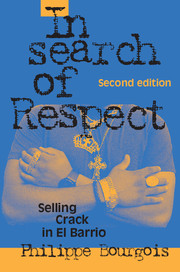Book contents
- Frontmatter
- Contents
- Acknowledgments
- Preface to the 2003 Second Edition
- Introduction
- 1 Violating Apartheid in the United States
- 2 A Street History of El Barrio
- 3 Crackhouse Management: Addiction, Discipline, and Dignity
- 4 “Goin Legit”: Disrespect and Resistance at Work
- 5 School Days: Learning to be a Better Criminal
- 6 Redrawing the Gender Line on the Street
- 7 Families and Children in Pain
- 8 Vulnerable Fathers
- 9 Conclusion
- Epilogue
- Epilogue 2003
- Notes
- Bibliography
- Index
- Other books in the series
6 - Redrawing the Gender Line on the Street
Published online by Cambridge University Press: 05 June 2014
- Frontmatter
- Contents
- Acknowledgments
- Preface to the 2003 Second Edition
- Introduction
- 1 Violating Apartheid in the United States
- 2 A Street History of El Barrio
- 3 Crackhouse Management: Addiction, Discipline, and Dignity
- 4 “Goin Legit”: Disrespect and Resistance at Work
- 5 School Days: Learning to be a Better Criminal
- 6 Redrawing the Gender Line on the Street
- 7 Families and Children in Pain
- 8 Vulnerable Fathers
- 9 Conclusion
- Epilogue
- Epilogue 2003
- Notes
- Bibliography
- Index
- Other books in the series
Summary
I used to take all my husband's shit. I even used to support my husband, but I woke and smelled the coffee, like they say. And I put a bullet in my man.
CandyThe gang rapes discussed in the preceding chapter were not the isolated brutal excesses of a fringe group of pathological sadists. On the contrary, they provide an insider's perspective on the misogyny of street culture and the violence of everyday life. A biting reminder of the pervasiveness of sexual violence in El Barrio was the comment made to my wife and me by our eleven-year-old neighbor, Angel, in the course of an otherwise innocuous, random conversation about how he was doing in school, and about how his mother's pregnancy was progressing. He told us he hoped his mother would give birth to a boy “because girls are too easy to rape.”
Witnessing Patriarchy in Crisis
Focused on in isolation, the crack dealers' accounts of gang rape can overwhelm readers with anger or despair. Women on the street, however, are not paralyzed by terror. On the contrary, they are in the midst of carving greater autonomy and rights for themselves in El Barrio, just as they are among most social classes and ethnic groups in the United States, and throughout much of the nonfundamentalist world. In East Harlem, daughters, sisters, and wives can no longer be beaten submissively and sent upstairs as authoritatively as they were in the past for socializing on the street, or for pursuing careers in the underground economy.
- Type
- Chapter
- Information
- In Search of RespectSelling Crack in El Barrio, pp. 213 - 258Publisher: Cambridge University PressPrint publication year: 2002

